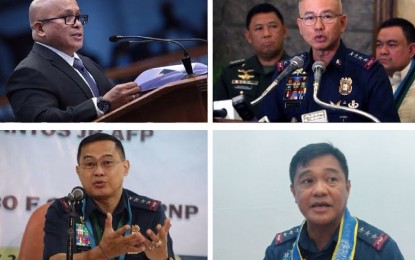
TOP COPS. Four members of the PMA Class of 1986 were consecutively named as chiefs of the Philippine National Police (PNP) by President Rodrigo Duterte. They are (clockwise) Senator Ronald "Bato" de la Rosa, Gen. Oscar Albayalde, Gen. Camilo Cascolan, and Gen. Archie Gamboa. (File photos)
MANILA – As in the military, appointments to critical posts in the Philippine National Police (PNP) are primarily determined by competence and seniority.
This was proven true by the recent appointments of four top cops all belonging to the Philippine Military Academy (PMA) Class of 1986, starting from retired general and now Senator Ronald “Bato” de la Rosa.
President Rodrigo Duterte has always been vocal about looking at seniority in making appointments in the police force – a trend that was observed in picking de la Rosa's successors.
Oscar Albayalde
Gen. Oscar Albayalde became the 22nd PNP chief, succeeding de la Rosa in April 2018.
Before being the top cop, Albayalde led the National Capital Region Police Office (NCRPO) and served as Pampanga police chief.
During his stint as NCRPO chief, he was known for conducting surprise visits to police stations and having zero tolerance for police officers caught sleeping and drinking on duty.

It was during Albayalde's term when the NCRPO successfully secured the 2017 Association of Southeast Asian Nations (Asean) summit in Manila.
Meanwhile, he sacked the entire Caloocan City police force over the deaths of Kian Lloyd de los Santos and Carl Angelo Arnaiz.
Archie Gamboa
Gen. Archie Gamboa took over the helm of the PNP as officer in charge in October 2019, replacing Albayalde who stepped down from his post after the controversy on an anti-drug operation during his stint as Pampanga police chief in 2013.
He was appointed by the President as PNP chief in January.

Just more than two months since he assumed as top cop, Gamboa's skills were tested as the country started the implementation of quarantine protocols amid the coronavirus disease 2019 (Covid-19) pandemic.
Days before the start of the community quarantine in March, he also figured in a near-death experience in a helicopter crash in Laguna.
Two of his classmates, Maj. Gen. Jose Maria Victor Ramos, the former director for comptrollership, and Maj. Gen. Mariel Magaway, who then headed the directorate for intelligence were badly injured in the accident.
As PNP chief, Gamboa said empowering people has become his top priority, noting that human resource is the most important resource of the police force.
As a result, he said, PNP operational units have gained strong footings against criminal activities, especially on the campaign against illegal drugs, illegal gambling, and terrorism, among others.
Camilo Cascolan
Despite having a short term ahead of him, Gen. Camilo Cascolan aims to boost the morale and take care of the welfare of police officers.
In his assumption speech as the country's 24th top cop on September 2, Cascolan said the PNP's comprehensive master development plan includes giving equal opportunity and leveling the playing field in the placement and promotion of personnel based strictly on performance, service reputation, and merit and fitness in establishing a rationalized "succession planning” and “career path".

During his stint as Metro Manila police chief from April to June 2018, he implemented the eight-hour work shift for police officers.
Under his watch, Cascolan also said the PNP would embark on an intensive drive to promote human resource development aimed at ensuring that every police officer "will know his or her job and do it well."
He said he would continue implementing the programs put in place by the PNP leadership, particularly in addressing Covid-19.
Cascolan will only serve for a little more than two months as he will reach the mandatory retirement age of 56 on November 10, unless President Rodrigo Duterte extends his term.
Recognition
Sought for comment, Interior Secretary Eduardo Año said the Chief Executive is only recognizing the fact that a lot of senior officers work hard and are fit for their posts.
"Hindi naman sila darating sa senior level kung hindi sila magagaling. Lahat magagaling, lahat pare-parehas na yan lahat ng two-star or three-stars ranks (They will not reach the senior level if they are not good. They are all good, all of them, whether they have two-star or three-star ranks)," Año said in an interview with the Philippine News Agency (PNA).
He added that respecting seniority is Duterte's way of expediting his decision in appointing his desired official.
However, there are times when the President would pick junior officials to sensitive posts if he feels that they are competent for the job, he said.
Año was referring to the case of de la Rosa who was the first PNP chief appointed by Duterte on July 1, 2016.
De la Rosa, then executive officer of the Directorate for Human Resource and Doctrine Development, jumped over a lot of senior officers from PMA Class of 1982, the batch where his predecessor, Gen. Ricardo Marquez, came from.
"The rule of seniority is right but it does not apply all the time. Just like in the case of former PNP chief Bato. That was not based on seniority. There is also this wisdom from the President that he wants to exercise. But of course, he looks at all factors in deciding on appointments," Año said in Filipino.
Following Cascolan's appointment as PNP chief, Lt. Gen. Guillermo Lorenzo Eleazar and Lt. Gen. Cesar Hawthorne Binag rose as the deputy chiefs for administration and operations, respectively.
This makes them the second and third highest officials of the police force.
Both Eleazar and Binag belong to PMA Class of 1987. (PNA)
